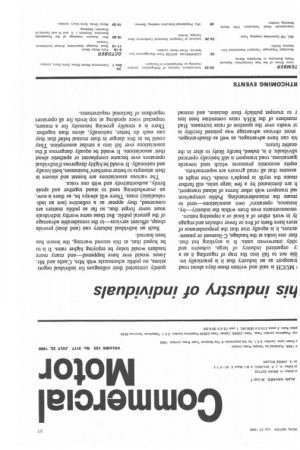his industry of individuals
Page 29

If you've noticed an error in this article please click here to report it so we can fix it.
I MUCH is said and written these days about road transport as an industry that it is practically imible not to fall into the trap of regarding it as a Ly organized industry of large, cohesive and )thly interwoven units. It is anything but that. ther one looks at the haulage, C-licensed or passen;ectors, it is equally true that the preponderance of ators have fleets of five or fewer vehicles and engage ly in work either of a local or a repeating nature. .onouncements even from within the industry—by, instance, operators' own associations—tend to etuate the misunderstanding. Public comparison )ad transport with other forms of inland transport, h are dominated by a few large units, still further etuate the myth in people's minds. One might as assume that all retail grocers are supermarkets. espite economic pressures which tend towards Ega.mations, road transport is still basically operated idividuals; it is, indeed, hardly likely to alter in the ;eeable future.
his can have advantages, as well as disadvantages. most obvious advantage was pointed forcibly in ht weeks over the question of rates increases. Had members of the RHA rates committee been less r to trumpet publicly their decision, and instead quietly contacted their colleagues for individual negotiations, no public schemozzle with Mrs. Castle and Mr. Jones would ever have happened—and many more hauliers would today be enjoying higher rates. It is to be hoped that, at this second warning, the lesson has been learned.
Such an individual industry can (and does) provide cheap, efficient services—to the considerable advantage of the general public. But these same worthy individuals must never forget that, so far as public matters are concerned, they appear as a collective (not an individualistic) mass. There will always be, as there is now, an overwhelming need to stand together and speak firmly, authoritatively and with one voice.
The various associations are honest and sincere in their attempts to better members' businesses, both locally and nationally. It would be highly dangerous if individual operators ever became complacent or apathetic about their associations. It would be equally dangerous if the associations ever fell into a similar assumption. They could be in this danger in their mutual belief that they can each do better, nationally, alone than together. There is a steadily growing necessity for a mature, respected voice speaking at top levels for all operators regardless of factional requirements.
























































































































